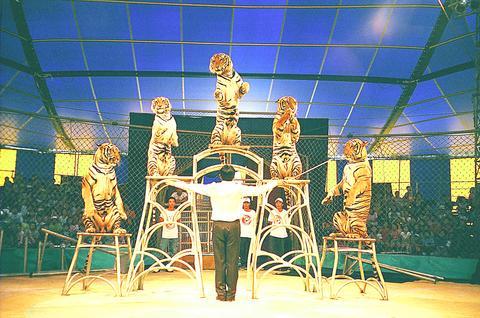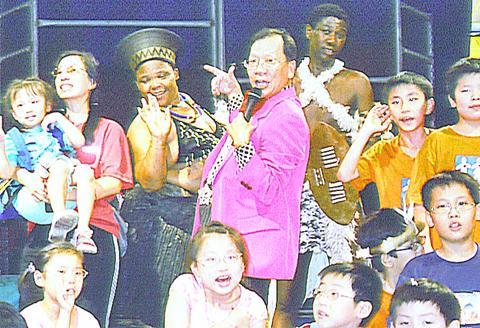Before setting off on a journey to find the African fair and circus show in Nangang be forewarned -- it starts at 10am and doesn't end until 3pm. Perfect for a 10-year-old, torture for someone looking for a quirky way to spend a day off.
What began as a long haul to the Taipei suburb Nangang in search of the "African Cultures on Show" advertised in a local newspaper, ended at the arrival of a fenced-off park filled with hundreds of children being led around by once-famous kids entertainer Dai Nan Siang (

PHOTOS COURTESY OF ASSOCIATION OF PROMOTION FOR STUDENT OUTDOOR
Dai, who is most remembered as TV personality Dai Laoshi (

PHOTO COURTESY OF ASSOCIATION OF PROMOTION FOR STUDENT OUTDOOR
The newspaper ad read, "An exhibition featuring the cultures of 40 African countries and a circus including various animals from Africa."
The reality was a day camp geared towards kindergarten and students that offers clowns, magic and dance routines, along with a few caged farm animals -- and six tigers from Thailand.
The events organizers, the Association of Promotion for Student Outdoor Education (
The scheduled day of activities begins with a circus that includes a Mongolian acrobat routine followed by the most popular event, a tiger show. After lunch there's juggling, sing-a-longs and an Indian magic show.
Apart from the short Q-and-A section near the start of the day and a 20-minute Egyptian dance performance at the end of the show all other activities have little or no African content. To be fair, however, there is an "African Fair," pavilion with a collection of some 40 photos and artifacts from various countries in Africa.
A yearly summer event around the island, it's the first time the circus has made a stop in Taipei. Dai Laoshi, who doubles as the organization's program director said each year they choose a new theme with the purpose of introducing different cultures to young learners in Taiwan.
The entire exhibition is open to the public, but for a shorter version the weekday camp activities are condensed into a two hour circus on the weekend.
The event is disappointing for anyone expecting a full fledged circus complete with trapeze artists, but the general consensus among the swarms of young people at the show suggest it's a lot better than a day spent inside a classroom.
For your information:
What: African-themed student day-camp and fair
When: Now until Aug. 29. Monday to Friday, 10am to 3pm, or Saturday and Sunday performances at 10am to 12pm, 1:30 to 3:30pm and 7:30 to 9:30pm
Where: In the field area adjacent to the Nangang Software Park, a 10 to 15 minute bus ride from Kunyang MRT Station (Blue Line) Bus: 51, 203, 281, 311, 620, 629, 645, 817.
Cost: NT$350 for the day camp, or NT$200 for the African Fair tent.

On April 26, The Lancet published a letter from two doctors at Taichung-based China Medical University Hospital (CMUH) warning that “Taiwan’s Health Care System is on the Brink of Collapse.” The authors said that “Years of policy inaction and mismanagement of resources have led to the National Health Insurance system operating under unsustainable conditions.” The pushback was immediate. Errors in the paper were quickly identified and publicized, to discredit the authors (the hospital apologized). CNA reported that CMUH said the letter described Taiwan in 2021 as having 62 nurses per 10,000 people, when the correct number was 78 nurses per 10,000

As we live longer, our risk of cognitive impairment is increasing. How can we delay the onset of symptoms? Do we have to give up every indulgence or can small changes make a difference? We asked neurologists for tips on how to keep our brains healthy for life. TAKE CARE OF YOUR HEALTH “All of the sensible things that apply to bodily health apply to brain health,” says Suzanne O’Sullivan, a consultant in neurology at the National Hospital for Neurology and Neurosurgery in London, and the author of The Age of Diagnosis. “When you’re 20, you can get away with absolute

May 5 to May 11 What started out as friction between Taiwanese students at Taichung First High School and a Japanese head cook escalated dramatically over the first two weeks of May 1927. It began on April 30 when the cook’s wife knew that lotus starch used in that night’s dinner had rat feces in it, but failed to inform staff until the meal was already prepared. The students believed that her silence was intentional, and filed a complaint. The school’s Japanese administrators sided with the cook’s family, dismissing the students as troublemakers and clamping down on their freedoms — with

As Donald Trump’s executive order in March led to the shuttering of Voice of America (VOA) — the global broadcaster whose roots date back to the fight against Nazi propaganda — he quickly attracted support from figures not used to aligning themselves with any US administration. Trump had ordered the US Agency for Global Media, the federal agency that funds VOA and other groups promoting independent journalism overseas, to be “eliminated to the maximum extent consistent with applicable law.” The decision suddenly halted programming in 49 languages to more than 425 million people. In Moscow, Margarita Simonyan, the hardline editor-in-chief of the